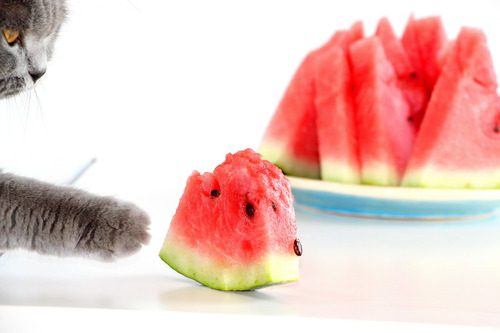Can Cats Eat Watermelon?
Nothing says summer quite like a juicy slice of watermelon. If you’re a cat owner who enjoys this sweet fruit, you may have caught your curious feline sniffing or even licking your snack. This might leave you wondering, can cats eat watermelon? This blog will explore the safety of feeding watermelon to cats, what to watch out for, and how to offer it the right way. While watermelon may seem harmless, not all fruits are suitable for cats, and it’s important to understand what’s safe and what should be avoided. Read on to find out whether this summertime treat has a place in your cat’s diet. If you have questions about your cat’s nutrition or need to schedule a visit, call Bottletree Animal Hospital at (662) 234-4336.

Is Watermelon Safe for Cats?
In small amounts, plain watermelon is generally safe for most healthy cats. This fruit is mostly made of water, which makes it refreshing and hydrating, especially on a hot Mississippi day. However, cats are obligate carnivores, which means their bodies are built to thrive on meat-based proteins rather than fruit. While watermelon isn’t toxic to cats, it doesn’t provide any nutritional benefits that they can’t get from their usual diet.
If you choose to offer watermelon to your cat, moderation is key. Small, seedless cubes offered as an occasional treat may be fine for some cats, but feeding watermelon in large amounts can lead to digestive upset. Some cats may not tolerate fruit at all, while others may enjoy a tiny bite without issue. It’s also important to be mindful of how watermelon is prepared and served.
Potential Benefits of Watermelon for Cats
While cats don’t need fruit in their diet, watermelon does have a few qualities that could appeal to certain cats, especially those who enjoy exploring new textures and tastes.
Hydration Boost
Because watermelon is made up of over 90% water, it can offer a small hydration boost. This may be helpful for cats who don’t drink enough water, especially during hot weather. Still, it’s not a substitute for clean, fresh water or moisture-rich food.
Enrichment and Novelty
Some cats enjoy the novelty of new foods, and a small taste of watermelon can be a fun sensory experience. Its soft texture and subtle sweetness may capture a curious cat’s interest. Offering small bites occasionally can contribute to enrichment, which supports your cat’s mental well-being.
Low-Calorie Treat Option
For cats on a restricted diet or those prone to weight gain, fruit isn’t always off-limits. A tiny piece of watermelon offers fewer calories than many commercial treats. Just be sure to offer it sparingly and not as a replacement for balanced meals.
Risks of Feeding Watermelon to Cats
Even though watermelon is not toxic to cats, there are some risks to keep in mind before adding it to your pet’s treat rotation.
Digestive Sensitivity
Cats’ digestive systems aren’t designed to handle fruit or sugar. Eating too much watermelon may cause stomach upset, diarrhea, or vomiting. If your cat has a sensitive stomach or any underlying health conditions, it’s best to avoid fruit altogether.
Sugar Content
Even natural sugar can be too much for cats. Watermelon contains fructose, and while it’s harmless in small quantities, it can be problematic if fed regularly or in large amounts. Cats don’t taste sweetness the way humans do, so offering sugary foods may not be enjoyable or beneficial for them.
Seeds and Rind
Never feed watermelon seeds or rind to your cat. The seeds can pose a choking hazard or lead to intestinal blockage. Some seeds also contain small amounts of compounds that can be harmful in large doses. The rind is tough and difficult to digest, increasing the risk of gastrointestinal issues.
How to Offer Watermelon to Your Cat
If you’d like to let your cat try watermelon, be sure to do so in the safest way possible.
Preparation Matters
Start by removing all seeds and the rind. Cut the fruit into small, bite-sized pieces that your cat can easily chew. One or two tiny cubes are more than enough to offer as a treat.
Watch for Reactions
After your cat eats a small amount of watermelon, monitor them closely for any signs of digestive upset or unusual behavior. If your cat vomits, has diarrhea, or seems lethargic, stop offering fruit and contact your veterinarian.
Frequency and Portion Size
Treat watermelon like any other occasional treat. A few small bites once in a while is fine for most healthy cats, but it shouldn’t become a regular part of their diet. The majority of your cat’s nutrition should come from high-quality, meat-based cat food.
Cats and Fruit: What Other Fruits Are Safe?
Watermelon isn’t the only fruit cat owners are curious about. While cats don’t need fruit in their diet, some fruits are safer than others.
Fruits That Are Generally Safe in Small Amounts
- Blueberries: Low in sugar and full of antioxidants
- Strawberries: Safe in moderation, but high in sugar
- Apples: Only the flesh, not the seeds or core
- Bananas: Soft and digestible in small pieces
Fruits to Avoid
- Grapes and Raisins: Known to be toxic to cats
- Cherries: Pits and stems can be harmful
- Citrus fruits: Often cause gastrointestinal upset
- Avocado: Contains persin, which can be toxic in some forms
If you’re ever unsure whether a fruit is safe, always check with your veterinarian first.
Why Do Some Cats Like Watermelon?
It may seem surprising when your cat shows interest in watermelon, especially since they don’t taste sweetness the way humans do. But cats rely on scent and texture just as much as flavor.
The Appeal of Texture and Smell
The soft, juicy texture of watermelon can be intriguing to cats. Some may be drawn to the water content, especially if they enjoy licking ice cubes or drinking from dripping faucets. Watermelon has a mild scent and cooling feel that may seem appealing, particularly on warm days.
Curiosity and Mimicry
Cats are curious by nature. If they see you eating something and enjoying it, they may want to try it, too. This doesn’t necessarily mean they like the taste, sometimes it’s just a way of exploring their environment.
Call Us for Nutrition Questions or Pet Wellness Support
If you’ve ever wondered, can cats eat watermelon, the short answer is yes, but only in small, seedless portions and only on occasion. While watermelon is not toxic to cats, it offers limited benefits and may not suit every cat’s digestive system. When in doubt, stick to treats made specifically for cats and always prioritize balanced nutrition.
If your cat has tried watermelon or other unusual foods, and you’ve noticed changes in their appetite, digestion, or behavior, it’s time to talk with your veterinarian. At Bottletree Animal Hospital, we’re here to support your cat’s health through every stage of life. Call us at (662) 234-4336 to talk with our team about your pet’s nutritional needs and wellness care.
Recent Posts
About Us
Welcome to Bottletree Animal Hospital, your family-friendly veterinarian in Oxford. We are a team of animal lovers who are passionate about veterinary excellence. We love working closely with you and your pet to help us learn more about your furry friend, their lifestyle, and their needs.

